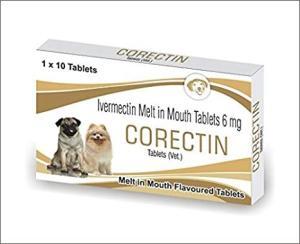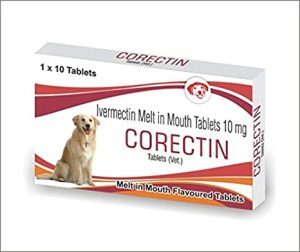Table of Contents
Ivermectin is a medication that belongs to the class of drugs known as antiparasitic agents. It is widely used to treat various parasitic infections in animals and as the best human dewormer.

What Is Corectin (Ivermectin)?
Corectin, or Ivermectin, is an FDA-approved parasite medication for treating parasitic infections caused by worms, mites, and insects. It is classified as an antiparasitic agent and is highly effective in combating a wide range of parasites. In addition, Corectin is available in different forms, such as tablets, oral liquid, and injectable solutions, making it convenient for administration to different animal species.
The wormer medicine targets the nervous system of parasites, leading to their paralysis and eventual death. It acts on specific receptors in the parasites’ nerve and muscle cells, disrupting their ability to communicate and coordinate movement.
In veterinary medicine for deworming, Corectin is commonly used to treat and control parasitic infections in animals such as dogs, cats, horses, cattle, pigs, sheep, goats, and others.
Apart from its established uses, there has been ongoing research and discussions about the potential benefits of Ivermectin for other conditions, including its antiviral properties. However, it’s important to note that further scientific studies and regulatory evaluations are necessary to establish the efficacy and safety of Ivermectin for these purposes.
Ingredients
What Corectin (Ivermectin), 10 mg tablet, contains:
- Ivermectin 10 mg.
Forms of Ivermectin
How is Ivermectin supplied?
Medication is available in various Ivermectin dosage forms, including tablets, oral liquids, injectable solutions, creams, and lotions. The specific formulation and strength of the medicine for worms in dogs and cats may vary depending on the intended use and the target species (animal or human). Lets’s check the most popular forms of medication.
Tablets
Corectin tablets are a common form of medication and are available in various formulations and sizes. How big are Ivermectin pills? The tablets can come in different shapes, such as round or oval, and may vary in color depending on the manufacturer. The size of the tablets can also vary, typically ranging from small to medium-sized, making them easier to administer to different animal species or humans.
Oral Liquid
Ivermectin is also available in oral liquid form. Thiquid Ivermectin usually comes in a bottle with a measured dropper or syringe for accurate dosing. This form is convenient for administering medication to animals.
Injection
The medicine is available in injectable form for veterinary use. A veterinarian typically administers the injection. Injectable Ivermectin allows direct medication delivery into the bloodstream, ensuring rapid and effective distribution throughout the body.
It’s important to note that the specific forms and availability of Ivermectin may vary depending on the country, manufacturer, and intended use (human or veterinary). Therefore, always follow the instructions provided by the veterinarian regarding the proper administration and dosage of the medicine in its specific form.
Uses of Corectin
So, what is the use of Corectin?
As mentioned, the medicine is used to treat various parasitic infections in both animals and humans. The specific indications for using Ivermectin may vary depending on the species and the type of parasite involved. Here are some common uses of Ivermectin in veterinary:
- Dogs: Many people ask: can Ivermectin get rid of heartworms? Corectin is often used to prevent and treat heartworm disease in dogs, transmitted through mosquito bites. It is also effective against certain mites and intestinal worms.
- Cats: Corectin can treat ear mites, certain intestinal worms, and other parasitic infections in cats.
- Horses: The medicine is commonly used to control and treat various parasites in horses, including strongyles, bots, and roundworms. It is an excellent horse wormer.
- Ivermectin for cattle, sheep, goats, pigs, guinea pigs, rabbits, sheep, and other animals: Medication controls and treats internal and external parasites specific to each animal species; for example, it may be a cow dewormer.
Who Can Take the Medicine?
Ivermectin is commonly used for treating parasitic infections in pets. Here are some crucial points regarding the use of medicine for different animals:
Ivermectin for Dogs
It is highly effective against heartworms in dogs, which are transmitted through mosquito bites. Additionally, Corectin can treat other common parasites in dogs, such as mange mites and certain intestinal worms. However, certain dog breeds, particularly herding breeds (e.g., Collies, Shetland Sheepdogs), may have a genetic sensitivity to Ivermectin.
Medication for Horses
Horses can benefit from Ivermectin as well. It is commonly used to control and treat parasites such as strongyles, bots, and roundworms in horses. Different formulations of Ivermectin are available for horses, including paste and liquid solutions.
Tablets for Cats
Corectin can also be used for treating parasitic infections in cats. It is effective against ear mites, hookworms, and certain intestinal worms. However, using formulations specifically designed for cats is crucial, as some dog formulations may be toxic to cats.
Ivermectin for Farm Animals
The medicine may also be used for other animals, such as goats, pigs, sheep, and guinea pigs, to control and treat various parasitic infections specific to each species. Always consult a veterinarian with expertise in treating particular animal species to ensure the correct dosage and safety precautions.
Ivermectin for Humans
In addition to its veterinary uses, Ivermectin is also prescribed as an antiparasitic medication for humans to treat certain parasitic infections, including scabies and specific worm infections.
While Ivermectin is generally safe when used as a parasite treatment of humans, there can be variations in dosages and potential sensitivities among different species.
Dosage Sizes
Here is an Ivermectin dosage chart for dogs, cats, and other animals outlining the general dosage sizes in ml. Please note that these are approximate guidelines, and it is essential to consult a veterinarian for accurate dosing instructions based on the specific condition and the individual animal’s needs:
|
Animal |
Dosage |
|
Dogs |
0.1 – 0.2 mg/kg orally or as directed |
|
Cats |
0.1 mg/kg orally or as directed |
|
Horses |
0.2 mg/kg orally or as directed |
|
Cattle |
0.2 – 0.4 mg/kg subcutaneously |
|
Sheep and Goats |
0.2 – 0.4 mg/kg orally or as directed |
|
Pigs |
0.3 – 0.4 mg/kg orally or as directed |
|
Guinea Pigs |
0.2 – 0.4 mg/kg orally or as directed |
How often to give Ivermectin to dogs?
The dosages may vary based on the concentration of Ivermectin in the specific product used. Therefore, always follow the guidance of a veterinarian and carefully read the product label for proper dosing instructions.
Should Ivermectin Be Taken With or Without Food?
In some cases, Ivermectin is recommended to be taken on an empty stomach; in others, it can be taken with or without food. Follow the instructions the healthcare professional or veterinarian provides or consult the product label for specific guidance.
Can You Mix Ivermectin With Water?
The ability to mix Ivermectin with water can depend on the specific formulation of the medication. Some forms of Ivermectin, such as oral liquids or injectable solutions, are designed to be mixed with water for administration. However, not all forms of the medicine are meant to be mixed with water. Tablets, for example, are typically taken orally without being dissolved in water.
To ensure proper administration, always follow the instructions provided by the healthcare professional, veterinarian, or product label.

Important Safety Information for Owners
While Corectin is generally safe when used as directed, there can be potential side effects and contraindications. In addition, adverse reactions and sensitivities may vary among individuals and different animal species.
Can you give Ivermectin to a pregnant animal?
The use of Ivermectin in pregnant animals should be approached with caution, and it is vital to consult a veterinarian before administering any medication during pregnancy. The safety of Ivermectin use in pregnant animals may depend on several factors, including the specific animal species, the stage of pregnancy, and the dosage used.
In some cases, Corectin may be considered safe for pregnant animals. Still, a veterinarian should carefully determine the dosage and timing of administration to avoid side effects of Ivermectin in pregnancy. In certain situations, alternative treatment options may be recommended to minimize potential risks to the developing fetus.
Veterinary Prescription
Is oral Ivermectin over the counter?
In many cases, a healthcare or veterinary professional prescription is required to obtain Ivermectin. This helps ensure the appropriate dosage, usage, and safety precautions are followed.
Contraindications
While Ivermectin is generally considered safe and well-tolerated, there are certain contraindications and precautions to be aware of. Here are some common contraindications for Ivermectin:
1. Hypersensitivity or Allergic Reactions: Animals with known hypersensitivity or allergic reactions to Corectin or its components should avoid its use.
2. Certain Breeds or Genetic Sensitivities: In dogs, certain breeds, such as Collies and related herding breeds, may have a genetic sensitivity to the medicine or other similar drugs.
3. Pregnancy: The use of Corectin in pregnant animals or humans should be cautiously approached. Consultation with a veterinarian or healthcare professional is necessary to determine the safety and appropriate dosage during pregnancy.
4. Young Animals: In some cases, the medicine may not be recommended for very young animals. A veterinarian should evaluate the dosage and safety for young animals.
5. Certain Medical Conditions: Corectin should be used cautiously or avoided in individuals or animals with conditions like liver disease or compromised immune function.
It is important to note that this is not an exhaustive list, and contraindications may vary depending on the specific situation and the individual’s health status.
Side Effects
Here are some common side effects associated with the use of Ivermectin:
- Gastrointestinal Disturbances: The most common side effects of Corectin include nausea, vomiting, diarrhea, and abdominal pain. These symptoms are usually mild and temporary.
- Dizziness or Drowsiness: Some individuals may experience dizziness or drowsiness after taking medication. It is advisable to avoid activities that require mental alertness, such as driving or operating machinery, until you know how the medication affects you.
- Allergic Reactions: Although rare, allergic reactions to Corectin can occur. Signs of an allergic reaction may include rash, itching, swelling, dizziness, difficulty breathing, or chest tightness. Seek immediate medical attention if you experience any severe allergic symptoms.
- Skin Irritation: Topical formulations of Ivermectin, such as lotions or creams, may occasionally cause skin irritation, redness, or itching at the application site.
- Neurological Symptoms: In rare cases, high doses of the medicine can cause neurological side effects, such as confusion, tremors, instability, or vision changes. These symptoms are more likely to occur in individuals with pre-existing neurological conditions or those who have accidentally taken excessive doses.
This is not a complete list of side effects, and other unexpected reactions may occur. If you notice any unusual symptoms after giving Corectin, it is advisable to seek medical attention or consult a veterinarian for proper evaluation and guidance.
Overdose
What happens when you give too much Ivermectin?
An overdose of Corectin can potentially occur if an animal takes more than the recommended dosage or if there is accidental ingestion of a large quantity of the medication. The risk of overdose is generally low when Ivermectin is used as directed. However, it’s essential to seek medical attention immediately in overdose cases. Here are some potential symptoms and considerations related to an overdose of Ivermectin:
- Neurological Symptoms: High doses of the medicine can affect the central nervous system, leading to symptoms such as dizziness, drowsiness, confusion, tremors, or unsteady gait. Severe cases may even result in seizures or coma.
- Gastrointestinal Disturbances: severe nausea, vomiting, diarrhea, and abdominal pain.
- Allergic Reactions: rash, hives, swelling, difficulty breathing, or chest tightness. Anaphylaxis, a severe and potentially life-threatening allergic reaction, is a medical emergency that requires immediate attention.
If you suspect an overdose of Ivermectin or notice any severe symptoms, contact a healthcare professional or seek emergency medical care immediately. They will tell you how to treat the condition. Be prepared to provide information about the amount and timing of Ivermectin ingestion to assist with appropriate medical intervention.
Corectin Poisoning
Ivermectin poisoning can occur when an animal ingests or is exposed to a toxic amount of Ivermectin. Misuse or accidental ingestion of excessive amounts can lead to poisoning. Here is some information about Ivermectin poisoning:
Symptoms: The symptoms of medicine poisoning can vary depending on the dosage, route of exposure, and individual factors. Common symptoms may include nausea, vomiting, diarrhea, abdominal pain, dizziness, drowsiness, tremors, unsteady gait, and visual disturbances. Severe cases can exhibit more serious symptoms such as seizures, coma, low blood pressure, and respiratory distress.
Treatment: Is ivermectin toxicity reversible? If Ivermectin poisoning is suspected, seek immediate medical attention or contact a poison control center. The healthcare professional will assess the situation and provide appropriate treatment based on the severity of symptoms. Treatment may include supportive measures such as intravenous fluids, medications to control symptoms, and close monitoring of vital signs. In severe cases, hospitalization may be required.
Prevention: Use the medication as directed by a healthcare professional or veterinarian to prevent poisoning. Follow the recommended dosage, route of administration, and frequency of use.
Storage
Should Ivermectin be stored in the fridge, and does Ivermectin go out of date?
Keep Corectin and other medications stored securely and out of reach of children and pets to avoid accidental ingestion. If you have unused or expired medication, dispose of it according to local guidelines or consult a pharmacist. The medicine should be stored at room temperature, typically around 20-25°C (68-77°F). Avoid exposing it to extreme temperatures, such as freezing or high heat, protect it from light, and keep it in original packaging.
Generic and Brand Names of Corectin (Ivermectin)
Does Ivermectin go by another name?
It is available under various generic and brand names worldwide. Here are some examples of generic and brand names of Ivermectin:
Generic Names:
- Ivermectin;
- Ivermectina;
- Ivermectine;
- Ivermectini.
Brand Names:
- Corectin;
- Stromectol;
- Mectizan;
- Ivomec;
- Soolantra;
- Scabo;
- Iverfast;
- Ivera;
- Iverjohn;
- Ivert;
- Iverbe.
Please note that availability and specific brand names may vary by country and region. Is Ivermectin near me, or where to get Ivermectin, and what is the price? You may buy Ivermectin online.
Other Drugs in the Same Class
Corectin belongs to a class of medications known as macrocyclic lactones or avermectins. These drugs have similar mechanisms of action and are used to treat parasitic infections. Here are some examples of drugs in the same class as Ivermectin:
- Doramectin;
- Selamectin;
- Eprinomectin;
- Milbemycin.
These are just a few examples of drugs that belong to the same class as Ivermectin. It’s important to note that while these drugs may share similarities in their mechanisms and applications, they may differ in their specific indications, formulations, and dosages.
FAQ
Can the Medicine Be Given with Blood Thinners?
Consult a veterinarian before taking Corectin with blood thinners to assess potential interactions and determine the appropriate action.
Can Ivermectin Be Used to Treat Cancer?
It is primarily used to treat parasitic infections and is not typically used as a treatment for cancer. Its effectiveness against cancer is still being investigated; further research is needed in 2023.
Can You Give Corectin to a Dog with Diabetes?
Consult a veterinarian before giving Corectin (Ivermectin) to a dog with diabetes to evaluate the potential risks and benefits based on the individual dog’s health condition.
Why Does Ivermectin Need to Be Taken on an Empty Stomach?
Taking Ivermectin on an empty stomach helps optimize its absorption and effectiveness. Food in the stomach can interfere with the absorption of the medication.
Which Worms Do These Tablets Kill?
Ivermectin is effective against various parasitic worms, including intestinal worms (e.g., roundworms, hookworms), certain mites, and lice. However, the specific type of worm it targets may vary based on the intended use and formulation of Ivermectin.
Where and How Is Ivermectin Metabolized?
Ivermectin is primarily metabolized in the liver through the cytochrome P450 enzyme system.
What to Expect Taking Ivermectin?
The effects of taking Ivermectin can vary depending on the animal and the condition being treated.
When Is It Too Late to Start Deworming?
It is best to start deworming as early as veterinarians recommend to manage and prevent parasitic infections effectively. However, even if started later, deworming can still be beneficial.
What Happens if Ivermectin Is Given Intramuscularly?
Ivermectin can be given intramuscularly in certain situations, but the specific effects and considerations may vary depending on the condition being treated and the individual’s overall health.
Is Ivermectin an NSAID?
No, Ivermectin is not an NSAID (Nonsteroidal Anti-Inflammatory Drug). It is an antiparasitic medication.
Is It Safe to Take Dewormer Long Term?
The safety of long-term dewormer use depends on the specific dewormer and the individual’s health condition.
Is It OK to Take Aspirin or Ibuprofen with Ivermectin?
We recommend consulting a veterinarian before giving aspirin with Ivermectin to assess potential interactions and determine the appropriate course of action.
How Long Does Corectin Take to Kill Scabies?
The time it takes for Corectin (Ivermectin) to kill scabies can vary. It may take up to a few weeks for the medication to completely eliminate the scabies infestation.
How Long Does the Medicine Stay in Your System?
Generally, it has a half-life of around 18 hours, but it may take several days for it to be eliminated from the body.
How Long Does Ivermectin Keep Working?
The duration of Ivermectin’s effectiveness can vary depending on the specific condition being treated. For example, for some parasitic infections, a single dose of Ivermectin may be sufficient to eliminate the parasites. However, multiple doses or a more comprehensive treatment course may be necessary in other cases.

































